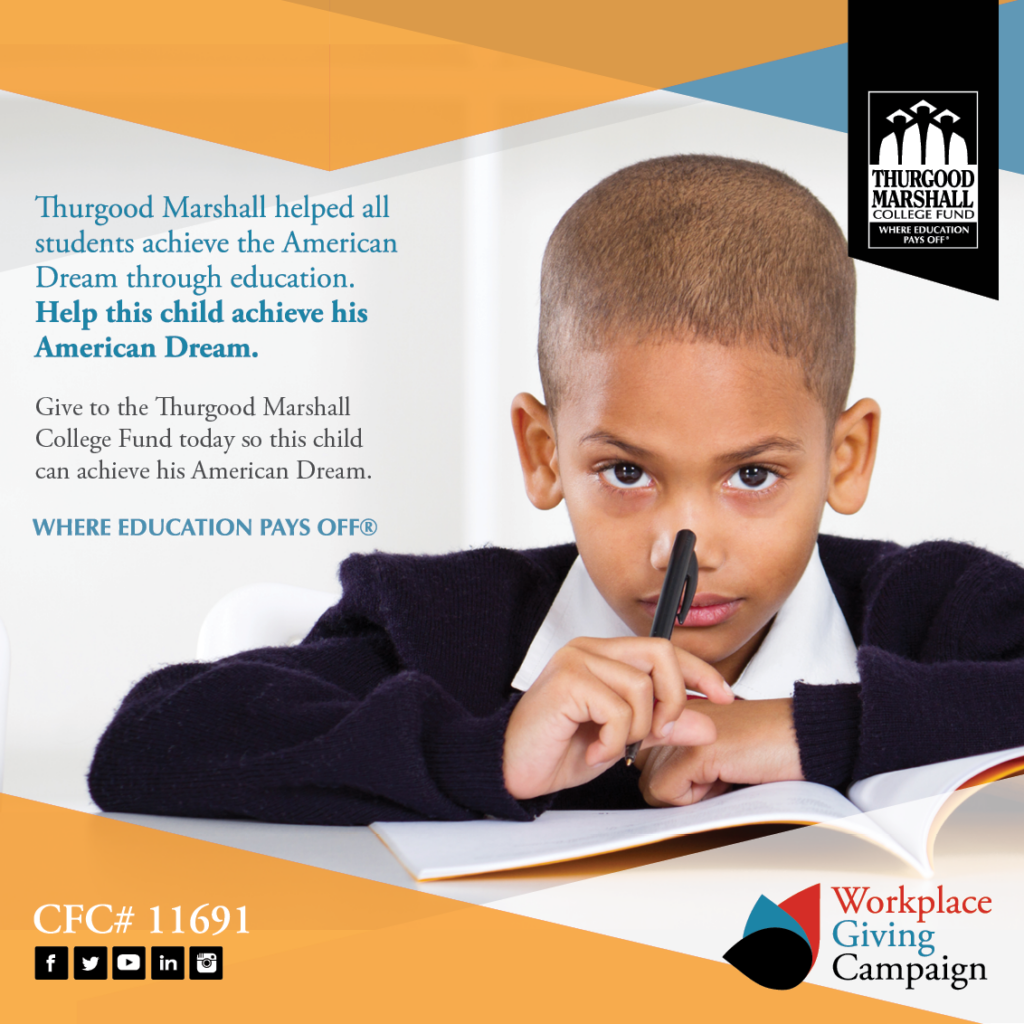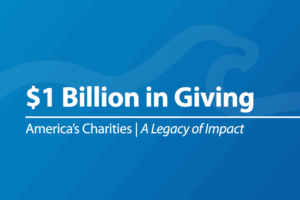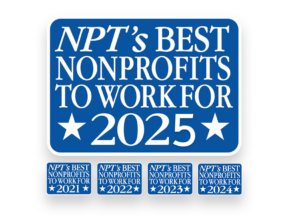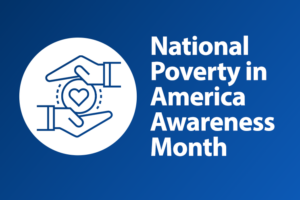Johnny C. Taylor, Jr., President & CEO, Thurgood Marshall College Fund | September 12, 2016
Shaping the American Dream by Investing in Education
Join America’s Charities, now through December, as we highlight different nonprofits and share how individuals and companies can Shape the Future of various causes through workplace giving programs.
 What is your American Dream? Is it wealth, success or fame?
What is your American Dream? Is it wealth, success or fame?
For many Americans, their dream is to provide a better future for their children, hinging on financial security.
Most families (97%) agree that the key to achieving that American Dream is through investing in their children’s college education.[1]
Yet, for a growing number of American families, meeting the full cost of college is an obstacle to achieving that dream, causing the greatest amount of stress (twice that of either medical or household expenses),[2] often leading a student to drop out, transforming that American Dream into Langston Hughes’ dream deferred.
The Thurgood Marshall College Fund (TMCF) is investing in those American Dreams. The only national organization representing America’s 47 publicly-supported Historically Black Colleges and Universities (HBCUs) and the nearly 300,000 students attending them each year, TMCF facilitates college access through affordability, completion and career success for low-resourced students.
TMCF member-school students are primarily low-income (75% are Pell Grant eligible, and 97% seek financial aid), with the majority being first-generation (52%). TMCF’s Scholarship Program provides both monetary and non-monetary wrap-around resources, resulting in a 97% graduation rate for TMCF Scholars (versus a 41% national average), and an 85% continuation rate for TMCF First-Generation (versus a 10% national average).
For the 2016-17 school year, TMCF is on track to award over 500 scholarships to high-achieving, low-income HBCU students, with nearly half awarded to first generation students. These scholarships cover the full cost of in-state tuition and mandatory fees for each student.
With high returns – an average $1 million increase in lifetime earnings for each college degree – higher education is the only investment that can lift a child out of poverty and into their American Dream. Yet, students first need to be able to meet the full cost of college in a way that will best position them for future success.
Sallie Mae reports that on average, families spend $23,290 per year on the total cost of 4-year public colleges.[3] To meet these costs (tuition, fees, room and board), nearly 80% of low-income students rely on loans – which have a disproportionately negative impact on minority and low-income students’ future economic stability and wealth accumulation, deferring their American Dreams.
Long-term, student loans feed the wealth gap by hampering mortgage approval rates and homeownership – with the greatest impact on minorities, according to The Federal Reserve and the Pew Research Center.[4] Creating future, stable family wealth through investing in today’s college students is the best way to address this growing wealth gap, and ensure that families have resources to invest in the next generation of qualified students.
Moreover, a college degree is increasingly mandatory for achieving one’s American Dream. The Great Recession re-distributed jobs within the American economy away from those that do not require a college degree (-5.5 million net jobs since 2010) to those that do (8.6 million net jobs created since 2010).[5]
TMCF’s Scholarship Program bridges the resource gap and lead to graduation. With our last-dollar strategy, TMCF helps qualified students to maximize their ability to meet the full cost of college, continue their studies, earn their degree, enter economically sustainable careers and achieve their American Dream.
Indeed, new college evaluation methods reveal that TMCF member-schools excel at facilitating student movement from low-income to economic sustainability. The 2015 Social Mobility Index rated three TMCF member-schools in the top 10 of all colleges nationally whose degrees help students move into the top half of incomes, with two more schools in the top 25.
Additionally, a Brookings Institute analysis[6] showed that degrees from six TMCF member-schools boost graduates’ occupational earning power both after graduation and mid-career, calling one TMCF member-school America’s #3 “hidden gem”. Ten years after graduation, these schools’ alumni earn up to 28% more than predicted for their majors.
Even with our proven record, TMCF can only help a limited number of students achieve their dreams.
For each TMCF scholarship recipient, there were eight other qualified students who we could not help – solely due to limited financial resources – whose dreams may become deferred forever.
For each $1 in support TMCF awards, we have identified an additional $10 in need.
Fortunately, the solution is simple. Each donation to TMCF, no matter how small, helps expand our ability to facilitate even more students’ American Dreams.
By giving through your company’s Workplace Giving Campaign, you can maximize the impact of your donation. For example, a $25 donation deducted automatically from each paycheck (26 pay periods) – adds up to $650 over the course of a year. With a matching gift from your employer, your gift of $25 per week becomes $1,300 to TMCF to help students.
Indeed, each $125 per paycheck donated by employees, with an employer match, translates into one one-year scholarship for a high-achieving, low-resource student – moving that student one year closer to achieving his or her American Dream.
America’s future is shaped by our investments today – and our best investment is in our youth and their dreams of a better tomorrow. With your Workplace Giving donation, you can help TMCF facilitate more American Dreams for our member-school students, shaping a better future for America – one student at a time.
Johnny C. Taylor, Jr. is the President & CEO of the Thurgood Marshall College Fund (TMCF). Established in 1987, TMCF represents all Historically Black Colleges and Universities (HBCUs), and its member-schools include the 47 publicly-supported HBCUs. Through its scholarships and programs, TMCF plays a key role in preparing tomorrow’s leaders. For more information, go to: www.tmcf.org.
Our thanks to Thurgood Marshall College Fund (TMCF) for sharing their mission and impact with us. You can learn more about their work by visiting their website at tmcf.org. To support their efforts, please donate to TMCF through your company’s workplace giving program (CFC#11691 if you’re a military or federal employee participating in the Combined Federal Campaign).
If your company would like to start a workplace giving program to support nonprofits like TMCF, click here. We have a portfolio of solutions designed to help large and small organizations give back to the causes they care about.
[4] http://blogs.wsj.com/economics/2015/01/08/wealth-homeownership-lag-for-americans-with-student-debt/ and http://www.pewresearch.org/fact-tank/2014/12/12/racial-wealth-gaps-great-recession/
[6] http://www.brookings.edu/research/reports2/2015/04/29-beyond-college-rankings-rothwell-kulkarni#interactive

Get Resources and Insights Straight To Your Inbox
Explore More Articles
$1 Billion in Giving: America’s Charities Reaches a Historic Milestone
A testament to the impact of mobilizing the power of giving. We have some extraordinary news to share. In 2025, America’s Charities crossed a threshold that few organizations…
America’s Charities Named ‘Best Nonprofit To Work For’ For Fifth Consecutive Year
Washington, D.C. – April 1, 2025 – America’s Charities, the nonprofit that mobilizes the power of giving as a leading provider of volunteering, workplace giving,…
Get Resources and Insights Straight To Your Inbox
Receive our monthly/bi-monthly newsletter filled with information about causes, nonprofit impact, and topics important for corporate social responsibility and employee engagement professionals, including disaster response, workplace giving, matching gifts, employee assistance funds, volunteering, scholarship award program management, grantmaking, and other philanthropic initiatives.





